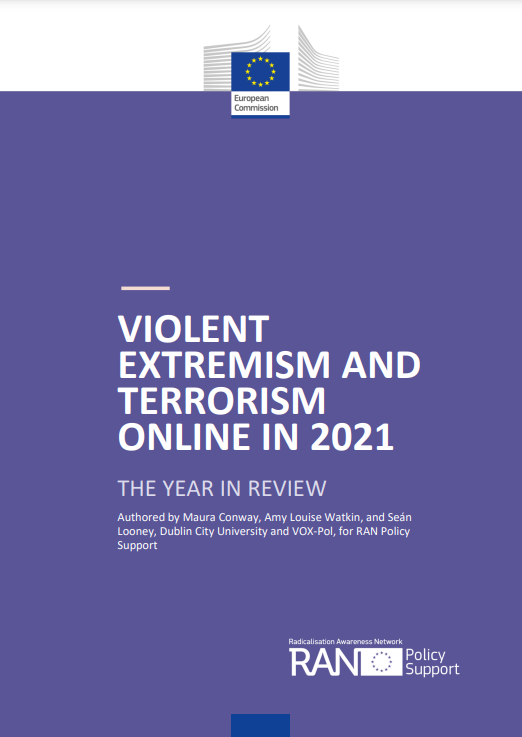Post Type Description
The Use of the Internet and the Internet of Things in Modern Terrorism and Violent Extremism
September 18, 2023This chapter will examine the role of the Internet and associated technology such as the Internet of Things (IoT) and cloud computing (CC) in the process of radicalisation to terrorism and violent extremism. Particular emphasis will be placed upon the role of online environments in facilitating communication and the spread of extremist ideology, as opposed ...
Violent Extremism and Terrorism Online in 2021: The Year in Review
September 18, 2023This report treats developments in the violent extremist and terrorist online scene(s) in the 12-month period from 1 December 2020 to 30 November 2021. It accomplishes this by surveying, describing, and integrating the findings of relevant articles and reports produced by academics, thinktanks, civil society, and governmental organisations; high quality media coverage; and the first ...
The Internet of Things and Terrorism: A Cause for Concern
September 18, 2023Over recent years, there have been rapid advances in information and communication technology. The Internet of Things (IoT), an instance of such technologies, has brought numerous benefits to societies, revolutionising the lifestyles of many individuals living in these societies. Whilst advances in the IoT undoubtedly offer numerous benefits, they simultaneously present a wide range of ...
The Impact of the Internet and Social Media Platforms on Radicalisation to Terrorism and Violent Extremism
September 18, 2023This chapter critically discusses the evidence suggesting that the Internet and SMPs affect radicalisation to violent extremism. The chapter specifically focuses on arguments surrounding echo chambers, opportunities for women to remain anonymous and the role of identity construction for the youth. The study also critically discusses the evidence negating the notion that the Internet and ...
Why They Do It: Counterspeech Theories of Change
September 18, 2023People who do counterspeech almost universally want to reach audiences, not the people spreading harmful speech. Drawing on over 50 interviews with counterspeakers, this paper reports on four primary theories of change as counterspeakers describe them, and discusses the implications of this for researchers. ...
More than a Joke: White Supremacist Humor as a Daily Form of Resistance
September 18, 2023We conduct an ethnographic content analysis to examine the social interaction and racial identity constructed through the exchange of white supremacist humor shared on three Stormfront discussion subforums. Overall, white supremacist joke sharing functioned multidimensionally as it simultaneously fostered cohesion and contention among users. By mocking political correctness and non-Whites through the circulation of humorous ...
The Representational Strategies of Lionization and Victimization in ISIS’s Online Magazine, Dabiq
September 18, 2023This paper is a multimodal critical discourse study of self-representation in ISIS’s e-magazine, Dabiq, employing Social Movement Theory and Van Leeuwen’s Socio-semantic Inventory. By analyzing the linguistic and non-linguistic features in the representation of social actors and actions in Dabiq, ISIS’s implied ideology at the macro level, which is to convince the prospective recruits and ...
The Threat of Terrorist and Violent Extremist Operated Websites
September 18, 2023A new report from Tech Against Terrorism has found that global terrorist and violent extremist actors are running at least 198 websites on the surface web. In-depth analysis of 33 of the most prominent websites – run by actors such as Islamic State, al-Qaeda, Atomwaffen Division and the Taliban – confirms that these sites have ...
Digitalization and Political Extremism
September 18, 2023Information and communication technologies shape, direct, and deter political behaviour and institutions as the increase in internet usage regulate our daily lives. The advance of internet and digital media also shape political involvement, partisanship, and ideology. Internet, as the new media, is an important information source that shapes political behaviour along with other effects on ...
Cannibalizing the Constitution: On Terrorism, the Second Amendment, and the Threat to Civil Liberties
September 18, 2023This article explores the links between internet radicalization, access to weapons, and the current threat from terrorists who have been radicalized online. The prevalence of domestic terrorism, domestic hate groups, and online incitement and radicalization have led to considerable focus on the tension between counterterror efforts and the First Amendment. Many scholars recommend rethinking the ...
